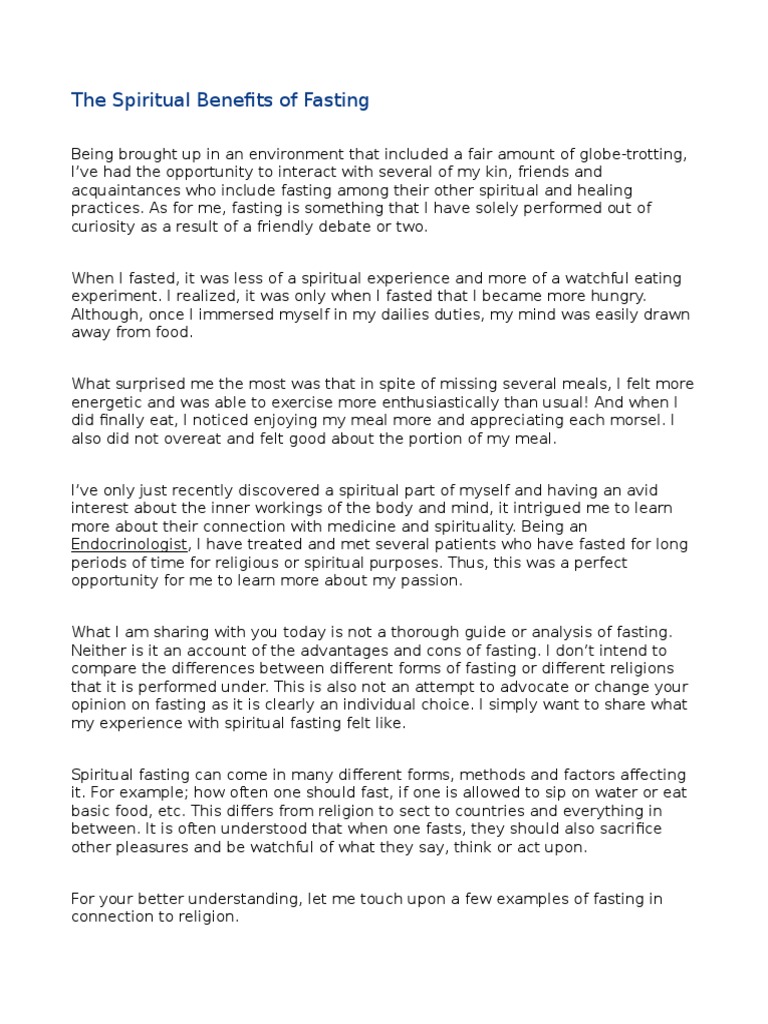Fasting, a profound spiritual practice embraced by numerous religions, occupies a pivotal position within the Bahá’í Faith. For Bahá’ís, fasting transcends mere abstention from food; it embodies a holistic approach towards rejuvenating the body, purifying the mind, and nourishing the soul. The Bahá’í fast occurs annually from March 2 to March 20 and serves as a period of reflection, meditation, and self-discipline. This article delves into the multifaceted benefits of fasting as expounded in Bahá’í teachings, illuminating its holistic dimensions and inviting practitioners to engage deeply with its spiritual significance.
The Body: Health and Resilience
From a physiological perspective, fasting can confer numerous health benefits. During this period of abstention, the body undergoes a process of detoxification. By refraining from food during daylight hours, individuals allow their digestive systems to rest and divert energy toward cellular repair. This is not merely a physical restraint but a practice that draws attention to one’s bodily needs, fostering a more attuned relationship with one’s physical state.
Research suggests that intermittent fasting may also promote metabolic health, contributing to weight management and improved cardiovascular function. However, within the framework of Bahá’í teachings, the emphasis extends beyond physical vitality. Fasting serves as an opportunity to cultivate discipline and willpower, essential attributes in the journey of spiritual development. The struggle to forgo material comforts during fasting can forge resilience and perseverance, qualities indispensable for overcoming life’s various challenges.
The Mind: Clarity and Focus
Fasting provides an intriguing counterpoint to the incessant demands of modern life. By removing oneself from the daily cacophony of distractions, individuals can cultivate a tranquil mental space conducive to introspection. This clarity of mind allows for deeper reflection on personal and communal goals, aligning one’s life with higher spiritual aspirations.
Moreover, Bahá’í teachings underscore the importance of prayer and meditation during the fast. These practices serve as a beacon, guiding the mind toward contemplation of divine attributes and increasing awareness of one’s responsibilities to fellow human beings. Engaging in daily prayer during fasting enhances cognitive focus, enabling individuals to approach both personal and communal challenges with renewed vigor and insight.
The fast encourages individuals to refine their thoughts and actions. In abstaining from food and drink, one is reminded of the spiritual sustenance that comes from prayer and reflection. This intentional shift can diminish the mental fog that often clouds judgment, leading to heightened motivation and clarity in one’s actions and decisions. Hence, fasting not only enhances physical health but also catalyzes a metamorphosis of the mind.
The Soul: Spiritual Awakening
At its core, fasting in the Bahá’í Faith is fundamentally a spiritual exercise. It is a time dedicated to seeking divine proximity, a reaffirmation of the soul’s journey toward God. This period signifies a retreat from materiality, prompting individuals to recognize and embrace their spiritual essence. By further immersing oneself in prayer and spiritual readings, fasting can reignite the flame of one’s faith.
In Bahá’í belief, the soul thrives on spiritual nourishment, which can be cultivated through diligent prayer, study of the Scriptures, and acts of service to humanity. During fasting, practitioners are encouraged to engage with the Bahá’í writings, fostering a connection to the divine that is often overshadowed in daily life. This spiritual engagement broadens one’s understanding of the universe and one’s place within it, catalyzing profound personal transformation.
The fast also offers an opportunity to demonstrate compassion and solidarity with those experiencing hunger and deprivation. By voluntarily experiencing the discomfort of hunger, Bahá’ís develop a deeper empathy for marginalized communities, fostering a spirit of human solidarity. This dimension of fasting is emphasized as a conduit for elevating one’s consciousness and deepening one’s commitment to social justice—hallmarks of Bahá’í teaching.
Integrating the Benefits: A Holistic Approach
The spiritual, mental, and physical dimensions of fasting are interconnected, each influencing the other. The practice invites individuals to reflect upon how neglecting any of these aspects can lead to imbalance and disharmony. As Bahá’ís embrace fasting, they do not merely view it as a ritual obligation but as a holistic undertaking that enriches their entire being.
To fully reap the benefits of fasting, practitioners are encouraged to maintain a balanced perspective. It requires careful preparation, including hydration prior to the fast and mindful consumption of nutritious food during non-fasting hours. Integrating light physical exercise, when appropriate, can also enhance the fast’s benefits for the body, mind, and soul. Adherents are encouraged to remain vigilant and open to the transformative experiences that arise during this sacred time.
Conclusively, the fasting period in the Bahá’í Faith is a rich tapestry of opportunities for spiritual growth and self-discovery. The observance invites a reconsideration of our relationship with the corporeal and the ethereal, promoting a synthesis of mind, body, and soul. As individuals engage in fasting, they are encouraged to contemplate not merely the abstention from food but the fostering of virtues that enhance their lives and align them with the divine purpose. Thus, the hidden benefits of fasting emerge, revealing its significance as a profound act of devotion that extends well beyond the corporeal realm.
